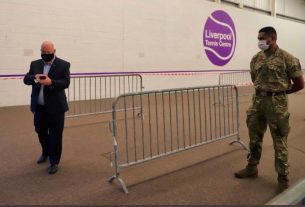Teachers in England and Wales have overwhelmingly voted to strike for seven days in February and March as their pay row with the government escalates.
In Scotland, teachers began 16 days of strike action on Monday (Jan 16) after talks between unions, local authorities and Nicola Sturgeon’s government in Holyrood failed to resolve the pay issue.
Members of the National Education Union (NEU) will walk out on February 1 after more than nine-in-ten voted for industrial action. 23,000 schools in England and Wales are expected to be affected.
On the same day, 100,000 civil servants will also be striking while the TUC (Trade Unions Congress) will hold a “national day of action” around the country to protect the “right to strike”.
Nurses, ambulance staff, rail workers, civil servants and Royal Mail employees are all taking industrial action this month over pay and working conditions.
Announcing their strike, NEU leader Mary Bousted and colleague Kevin Courtney said: “We have continually raised our concerns with successive education secretaries about teacher and support staff pay, and its funding in schools and colleges, but instead of seeking to resolve the issue they have sat on their hands.
“It is disappointing that the Government prefers to talk about yet more draconian anti-strike legislation, rather than work with us to address the causes of strike action.”
The NEU said teachers have had a real-terms pay cut of 23% since 2010 and are demanding an above inflation settlement this year to “correct historic cuts”.
“We regret having to take strike action and are willing to enter into negotiations at any time, any place, but this situation cannot go on” said the union.
Volunteers can cover teachers strike
Schools in England and Wales will be allowed to use volunteers to provide cover for striking teachers, reports the Independent. New guidance issued by the department for education (DfE) to schools calls on headteachers to “take all reasonable steps to keep the school open for as many pupils as possible”.
The teachers strike will mean that GCSE pupils will have had only one year of undisrupted learning through the course of their secondary school education.
Pupils who were in year 8 in 2020 will have missed at least 111 days at school because of Covid lockdowns.
“In the pandemic, we let a really terrible precedent take root which was the idea that school could be switched on and off and that teaching could be done with a laptop,” said Molly Kingsley, of parents’ campaign group UsForThem, quoted by the Telegraph.
“The Department for Education has to quash that notion, whether by making a deal with the unions or by putting contingency plans in place.”
Kingsley has accused the National Education Union (NEU) of having “little regard for children’s welfare and also for families, because how are families supposed to work?”
Elsewhere, Kinglsey has defended former Conservative MP Andrew Bridgen who had the party whip removed after he compared Covid vaccines to the Holocaust.
“Party political attacks on elected representatives for expressing lawful and honestly held opinions erodes our democratic system; indeed it is only a few short steps from authoritarianism”, tweeted Kingsley, a former lawyer.



